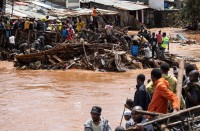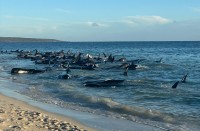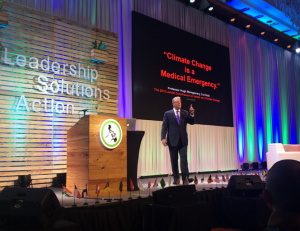
By Caesar Vallejos
Eagle News online correspondent
(Eagle News) — The Zika virus is connected to the climate crisis and climate change is now a medical emergency.
This was just one of the many observations of former United States Vice-President and global climate action advocate Al Gore when he visited the country and again made a call to action against the worsening global warming that the planet is experiencing.
At the recent Climate Reality Leadership Corps held by Al Gore’s team at Hotel Sofitel in Manila, Gore made dire predictions for planet earth and the Philippines – which he said is the country which had felt the brunt of the catastrophic effect of climate change.
His other predictions include the following:
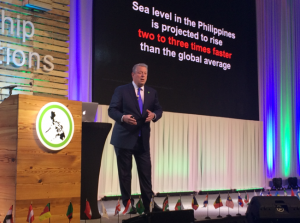
- The number one threat in economic stability in the world is the climate crisis.
- We are at the risk of losing 50% of all living species in the century.
- Sea level in the Philippines is projected to rise two to three times faster than the global average that may force 13.6 million Filipinos to relocate to higher grounds.
- By 2050, fish catch will decrease by 50% due to warmer waters in southern Philippines.
- The 14th or 15th hottest years ever have been recorded in the last 16 years. And the hottest of all was last year. 2016 is predicted to be hotter!
In linking the Zika virus to the climate crisis, Gore said, “It is one of the factors that has led one of the most distinguished medical journals in the world, the Lancet, to say that climate change is now a medical emergency for our world.”
“The struggle between people and microbes has been going on since our species began. But what works in our favor is cooler nights, colder winters, and conditions that inhibit the spread of mosquitoes and ticks and other factors that carry these microbes. We now have recognized the medical emergency connected to the climate crisis,” Gore added.
Climate crisis: number one threat in economic stability
Gore announced that the World Economic Forum in Davos surveys 750 economists every year and they just concluded that the number one threat in economic stability in the world is the climate crisis. “Partly because we have unburnable carbon fuels worth 28 trillion dollars and they are on the books of banks and multinational carbon companies around the world.
The amount of proven reserves ready to be produced is even larger. The amount that’s unburnable is 22 trillion dollars worth. This is a threat to the future of the global economy,” Gore stressed.
Consequences of hot temperatures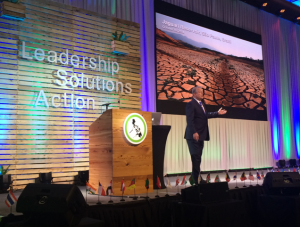
“Last summer in India, 1,300 people died in a heat wave. More than 1200 people in Iraq and Pakistan died under the same sun,” Gore recounted.
The Pacific Ocean, according to Gore, is 30 degrees Celsius warmer and it brought the most destructive ocean-based storm in the Philippines with horrific consequences, citing Yolanda (Haiyan).
“The most powerful hurricane to visit New York City crossed areas of the Atlantic, that were 5 degrees Celsius warmer than normal, flooded much of Manhattan Island, destroyed the coastline of New Jersey, and flooded even the 911 Memorial site,” Gore recounted.
Gore explained that the second order of consequences of ocean warming include the disruption of the water cycle, which begins with the evaporation of the water vapor off from the ocean into the sky.
“This means much more moisture into the atmospheric rivers that are pulled over the landmasses and when storm conditions trigger a release of that moisture, the downpours are much larger. Just look at the rain coming in over Tucson, Arizona as it slashes off the city. In the state of Louisiana, there was what the scientists refer to as a “rain bomb”, two feet of rain over three days had caused the largest flooding in the history of that region of the South Central United States,” he said.
“But these events are occurring with regularity now,” Gore said as he showed photos of unprecedented flooding in Chile, Spain, India and China.
This last December at the North Pole in the middle of the long dark polar night winter, a very powerful storm that brought heat energy and moisture from the tropics all the way across North America to the Arctic, raised the temperature of the North Pole by 28 degrees and began the thawing of the North Pole in the middle of the winter. “And the sun was not even shining there,” Gore remarked.
Massive deadly fires — another consequence of climate change
Extreme fires that cause massive destruction are another consequence of climate change.
Gore said one of the biggest and most destructive fires was in Russia killing 55,000 people.
“It also illustrated the interconnections among us all in the global economy. “Because four months after these fires took place all across Russia and Central Asia, all of Russia’s grain was pulled off of the world markets and food prices around the world went to a record high level for the second time in three years. And significantly, in North Africa, the Arab spring began when a food vendor set himself on fire. And the video enraged and mobilized people to start the Arab spring. There were many factors involved, but the record high food prices were significant in causing the political disruption,” Gore explained.
The climate related drought that began in 2006 in Syria destroyed 60 percent of their farms and killed 80 percent of their livestock.
“When the climate related extremes put extra burdens on people, they lose their capacity to control events. The refugees that flow from the Middle East and North Africa are fleeing violence. They are fleeing political oppression. But they are also fleeing conditions that have been caused in significant measure by the climate related historic drought,” Gore said in explaining the event in Syria. (part 2 tomorrow)

